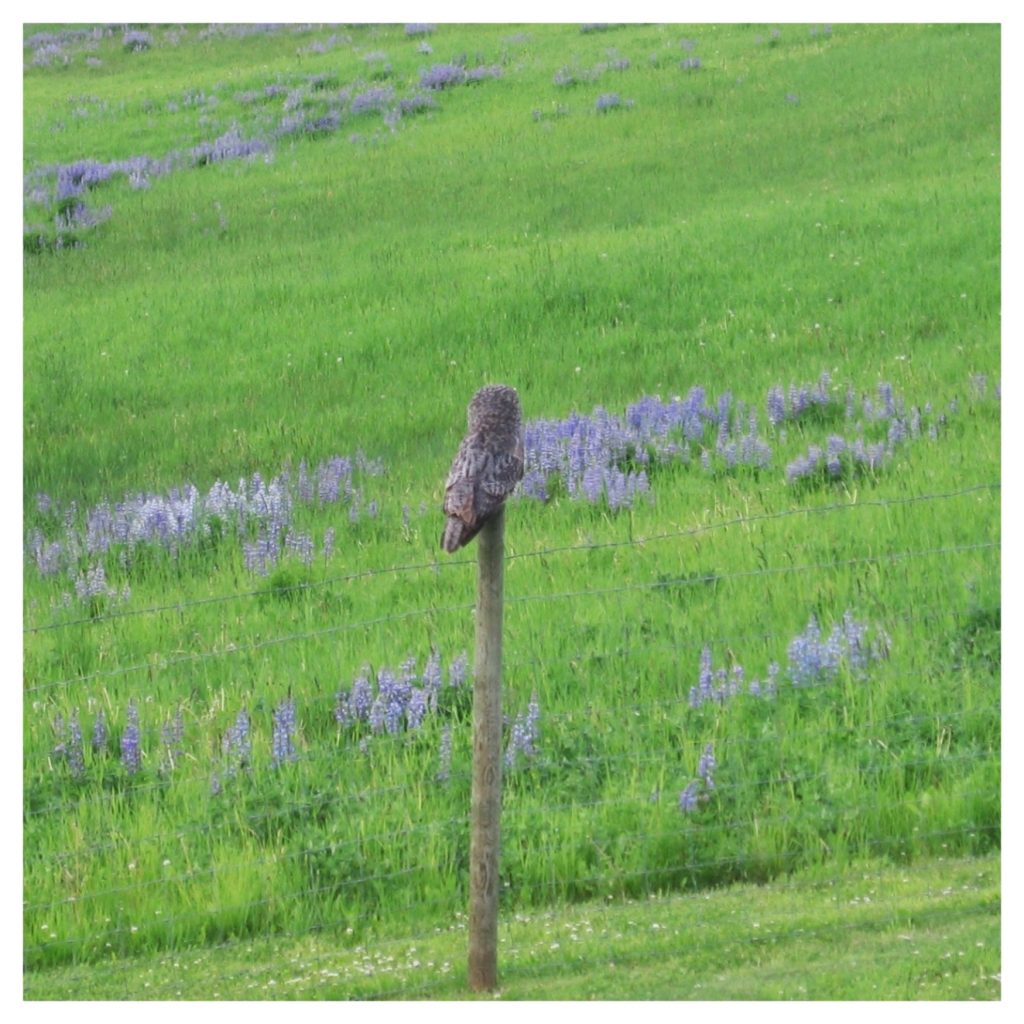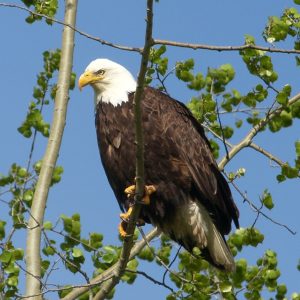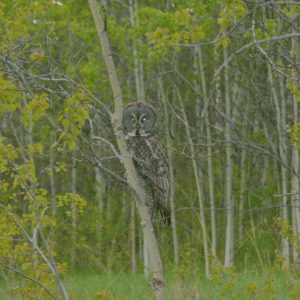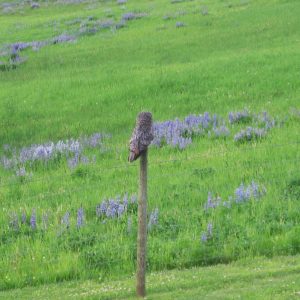Raptor Rescue Squad!
The Great Grey Owl is arguably the most elusive of the resident raptors found in the South Cariboo, hunting mainly at night, and infrequently seen during the day. A chance sighting of one that happened some years ago spawned the creation of our own “raptor rescue squad,” and ended up touching us in ways that we could never have imagined.
By Ann Simpson
Raptors!
Since the release of the Jurassic Park movies, we all now have a familiarity with this word and it usually conjures up menacing visions of ferocious dinosaurs on the hunt for unsuspecting humans. As entertaining as that may sound, this story will actually be a true one.
Our modern usage of the term ‘Raptor’ applies to the large and diverse taxa found in the scientific class of vertebrates known as ‘Aves’ – which literally translates to ‘Birds’ – and, more specifically, to certain birds that are predatory, or birds of prey. This reference has definitive links to our knowledge that the birds that exist today evolved from a group of small theropod dinosaurs that existed about 165 million years ago.
A raptor is typically defined as a bird of prey that feeds on other vertebrates (usually mammals) and they have certain physical characteristics in common: speed and strength; excellent eyesight; sharp talons; and curved beaks. While there are a host of birds that also feed on other animals that could share one or more of these features, not all are considered raptors. A heron is definitely not a raptor, but a hawk is absolutely a raptor.
There has always been something about a raptor that is captivating and awe-inspiring to us. We see the freedom in their ability to fly and soar at great heights, their strength and size will strike us as formidable, and yet, their actions are always performed with a grace that one would never believe possible in a creature of that power.
And then there are the eyes. The intensity of their focus is what we first notice, and then we look deeper and see something else that draws us in, and it truly is like looking into the soul of nature. They embody a true spirit that we respect and admire, and we feel a connection to the natural world that can be difficult to describe, but also one that is never forgotten once we are fortunate enough to experience it.
Our relationship with raptors is quite special though, unfortunately, most raptors can suffer from unintentional interactions with us. A great number of raptor injuries often occur from this contact and, perhaps because of this, we make special and extraordinary efforts to intercede in order to help in those cases, with the ultimate goal being to heal and rehabilitate these magnificent birds for an eventual return to the wild whenever possible.
It was in the early morning of May 24, 2017 when my parents and I noticed a large mob of crows a bit down the road that were behaving quite aggressively. They seemed to be fixated on attacking something on the ground. We weren’t able to see what the source of their ire was, so, my father walked the couple of hundred meters to see what was happening out there.
Just off to the side of the road in the grasses sat an owl. It was one of the beautiful Great Greys common to our region, though it was strange to observe it out in the open and in the daylight, just sitting there. It was obviously distressed by the angry crows, yet it was not moving to escape them.
Based on its smaller size, we believed it to be a male, and quickly realized that he did not flee because he couldn’t. We weren’t sure how long he had been out there, vulnerable and in the open, but it was likely that he had suffered a wing injury, possibly from contact with a passing vehicle when he was attempting to fly across the road. Sadly, this is not an uncommon incident, as these owls are in the habit of using very low flight paths during their night time prowls.
At this point, we were asking ourselves, what should we do? Firstly, was to try to provide this fellow some respite from the crows. That was my job. I walked down to him, and after chasing the crows away, I just stood guard over him. Fortunately, my continued presence nearby made the crows disperse, and they did not return. Perhaps I was imagining it, but I believed that I could see a little bit of relaxation in the owl’s demeanour. I like to think that he was more comfortable now, in spite of his desperate condition.
[We should not be too hard on the crows for acting in this way. It is their instinctive behaviour to employ this mobbing tactic in an attempt to deter a potential predator. In fact, the Great Grey Owl is known to prey upon the crows’ fledglings and as a result, a very real grudge has developed between the two species that spans generations.]
While I was with the owl, my mother started making some phone calls. Here in British Columbia, there is a wonderful non-profit organization called OWL Orphaned Wildlife Rehabilitation Society that is dedicated to the rescue, rehabilitation, and release of our resident raptors. And it just happened to be one of her favourite charities. Her decision to contact them immediately was the right one, as they very quickly joined the effort to help save this injured owl.
Typically, OWL would reach out to their network of rescue volunteers to assist, however none were within easy reach of our location, so they asked if we would be willing to perform the capture. With their helpful guidance and instructions, they explained to us the procedure and we readied ourselves to take the reins.
While I remained with the owl, my mother and father gathered what we would need. Very shortly, they arrived in our larger and canopied pickup truck with one of our bigger dog kennels and a large blanket.
The key to capturing a raptor was triangulation, so while I remained in front of the owl and made sure his eyes were fixated on my position, my parents proceeded to approach him from behind until they were positioned, in the rear, to the left and right of where he was sitting. Then, once they were ready, they held out the blanket and very gently draped it over him, so that it covered him completely.
He did not react or struggle beneath the blanket as my father gently lifted him up and carefully placed him inside the dog kennel. The kennel was then covered with the blanket, and the injured owl continued to remain very calm, and seemed to be comforted by the dark environment we had created for him.
After completing a very brief and slow return home, our next call was made to the staff of our amazing local veterinary clinic. Without hesitation, they said we could definitely bring the owl to them, where they would assess his condition and keep him stable until the next phase of the rescue could occur.
Then, another quick call to OWL … we let them know that we had successfully captured the owl and told them where we were taking him. By now, OWL had already made contact with one of their transport volunteers, and they would advise them of the injured owl’s pick-up location. He would then be taken on the 460 kilometre journey to their facility.
Not long after we returned home, we received a call from OWL to let us know that the injured raptor was already on his way to them and that a surgeon was on standby ready to perform the necessary operation that this owl was going to need in order to survive. We were also advised that the chances were likely slim that he could be returned and released back to the wild, in which case, he would remain with them for the remainder of his life, where he would be cared for and become one of their resident “teaching birds.” In this way, he could help OWL educate the public about the importance of these wonderful creatures in the world we occupy.
We never did receive any further updates about the owl, and assumed that he successfully underwent the surgery and was now living safely and comfortably at the rehabilitation facility. We were happy to believe that everything went well, and were grateful that we had played a part in saving this beautiful bird.
OWL did reach out to us at least twice in the subsequent years to see if we would be able to participate in another raptor rescue, though by this time my parents were a bit too elderly to participate and we sadly had to decline. But we always remembered our once and only deployment with pride, and we would often have conversations about the experience that somehow always began the same way – “Do you remember the little owl?” And then we would recount the exciting events of that morning when we were part of a raptor rescue squad.
We were having one such conversation again just a few weeks ago, and during the revisiting of those memories, I wondered if I should write something about the owl. I asked my mother if she could remember the exact dates of the events and if she had ever heard anything about the owl after his arrival at the rehabilitation facility.
Being the resourceful person that she is, my mother reached out to OWL and was connected with a very nice person who was actually one of the bird experts on the staff. He kindly went through the records but had to retrieve the information from files that had not been stored in their computer system. When he found the details, he called her back.
He was certain that he had retrieved the right file, as he could not find any other records of an injured raptor in the Bridge Lake area. He then relayed the details that he had found:
- May 24, 2017
- Bridge Lake
- Great Grey Owl
- Died en route.
It was not the news that we had hoped to hear, and I found myself once more replaying, in my mind, the events of that day. A pit had opened up inside me, and I felt a deep sadness now that I knew the outcome. Despite all the efforts of so many kind people, the little owl was too badly injured and could not be saved.
I also began to wonder if there was a reason why we never really wanted to know until now – it was always more comforting to believe that the little owl was happy and healthy, and living out the best life possible following the circumstances and severity of his injury. I spent many hours that day thinking about and mourning that little owl.
I regularly see published in our local newspaper the occasional and amazing story of a raptor rescue in the region. These stories are always the ones with happy endings, though I still marvel at the resourcefulness and extreme kindness of the people and volunteers who, when called upon, gladly choose to get involved to help these beautiful birds.
Our rescue story of a poor little owl did not have the type of ending that a newspaper would want to print for its readers. But this owl did have a story from that day back in May 2017, and he was remembered by everyone who made every effort to save him. He is still fondly remembered to this day by my parents, and by me – and with knowing his story, he lives on in our memories … he still lives.
For more information about OWL Orphaned Wildlife Rehabilitation Society and the wonderful work that they do, please visit owlrehab.org.
There are many such animal rescue and rehab organizations, in just about every region, that are in need of support. If you think that you would like to help, please do not hesitate to contact the one nearest you.
Note: All photos courtesy of the author.
“Raptor Rescue Squad!” ©2025. Ann Simpson and The Renaissance Garden Guy
Ann Simpson is a mycologist, writer, and regular contributor to The Renaissance Garden Guy. She resides in Bridge Lake, British Columbia, where she writes and remains in constant pursuit of her mysterious and surreally beautiful quarry. Click here to follow Ann Simpson on X (Twitter), and find her on Bluesky at Ann in Bridge Lake at Bluesky.
The Renaissance Garden Guy is a participant in the Amazon Associates Program. As an Amazon Associate, The Renaissance Garden Guy earns from qualifying purchases.
Additionally, The Renaissance Garden Guy is a participant in the Bluehost, SeedsNow, and hosting.com (formerly A2 Hosting) affiliate programs. The Renaissance Garden Guy earns a fee/commission each time a visitor clicks on an ad or banner in this site from one of these companies and makes a subsequent qualifying purchase.
Please click here to view The Renaissance Garden Guy Disclosure page.









Such a deep and moving story. The sad ending gave me tears. It is a story that makes you reflect on life.
Absolutely beautiful and well written.❤️
Thank you so much, Roxxy. It was quite sad to write about as well once I knew the outcome, but it was also a very touching experience that will never be forgotten. Thank you again for the lovely comments, Roxxy.
Dear Ann,
I am very excited for you and John. He is a true Renaissance man. Best wishes for a happy future.
Thank you so much, Rick. John and I are truly so very excited about our future together, and I cannot tell you how much I appreciate receiving your best wishes.
Ann’s story was beautifully and sensitively written. It requires caring people to rescue an injured raptor.
I agree with you, Rick, on all counts. It is a beautifully written and touching story, and the care and dedication of this little owl’s rescuers say a great deal about their character and values. Wonderful story, wonderful people.
Thanks very much, Rick, and even though our outcome was not a happy one, I would not hesitate to get involved if it ever happened again. These are such beautiful birds – we need them in our world.
That was a moving story. Sad that the owl you helped didn’t make it, but many others do survive due to efforts like yours, I’m sure. We see a lot of red-tailed hawk versus crow air battles here in San Francisco. They do seem to have an ongoing grudge with each other! Great piece, Ann!
Thanks so much, Lisa, and it was very sad to learn at the time. It is remarkable how many are saved due to the efforts of individuals and organizations, which is always comforting. And we see many similar grudge matches here involving crows – very smart birds!
I loved reading about the rescue but was saddend by the ending. Are we better off not knowing the truth and being happy, or are we better off knowing the truth and being sad? I think we all have to answer that question for ourselves. This is a beautiful story that really makes one pause and think.
Thank you so much, Kevin. And you do ask an interesting question. I’m not sure how others might choose to answer this, but knowing the truth in this case was important for me, even though it was sad. And I absolutely agree with you that it is a question that everyone needs to ask of themselves, especially when confronted with that type of choice. Thanks again, Kevin!